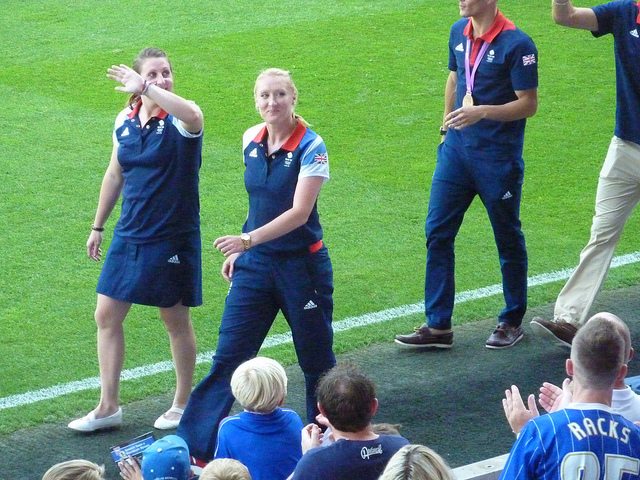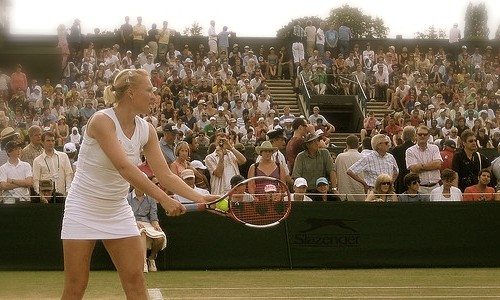We miss you, Bally
In a sport dominated by players who have noticeable personas off-court, often accompanied by lucrative media deals, it is refreshing to see someone whose sole focus is on what happens from the coin toss to the call of “Game, Set and Match.” That Elena Baltacha was able to maintain that level of commitment despite seemingly unsurmountable odds is a reflection of her strength of character, and it is truly heart-breaking that this piece has to be written as an epitaph.
Bally started her professional career in 1997. While most youngsters tried to play directly in the WTA, like that year’s breakout star Martina Hingis, the Scot decided to use the ITF tour to hone her skills. It was a risky move; on the one hand, it was less demanding, which is perfect for someone still developing their game, but on the other hand, it was monetarily difficult to maintain a career. Luckily for her, Baltacha was able to hit the right balance and, having tackled her weaknesses, began to make regular main draw appearances from 1999 onwards.
Tennis lost a trailblazer. The world lost an inspiration.
Between then until her final match in 2013, she was able to notch up 11 tournament victories as well as a slew of impressive wins against higher ranked opponents. Her ranking peaked at No. 49 in September 2010 and she was the British No. 1 for three non-consecutive years. Although she failed to make the second week at Grand Slams, she still thrilled the British fans, with one of her best Slam results coming at Wimbledon (3rd Round in 2002) and the majority of her titles coming on home soil. All of this amounts to a perfectly respectable career, better than many of her compatriots and definitely better than the vast majority who pick up a racquet professionally.
This all sounds commendable but a little ordinary. To understand what made Bally so extraordinary, one has to take a closer look. At Wimbledon 2003, she played one of her most memorable and hard-fought matches against Jelena Dokic, forcing the former semi-finalist to three sets before bowing out. Following her loss, Baltacha underwent invasive surgery to find the cause of lifelong health problems. Her ranking fell all the way to No. 373. More worryingly, it was discovered that she had a chronic liver condition that affected her immune system. Retirement was a serious consideration, given both the complexity of post-operation rehabilitation and the health risks of continuing on tour with her condition.
Instead, Baltacha returned to the tour in January 2004. She surprised everyone with solid showings in ITF tournaments, a memorable match against Jennifer Capriati at Wimbledon and a strong commitment to the sport by participating – and winning – in multiple Fed Cup ties. Dedication to the LTA was a particular trait of hers and her Fed Cup heroics definitely won over the hearts of many fans who are normally used to seeing players put individual ambitions ahead of the betterment of the sport. 2005 saw her reach the 3rd Round of the Australian Open, a result she would repeat in 2010.
Between those two Aussie results, however, she hit another roadblock when she needed to undergo back surgery in 2006. Having worked hard to climb back up the rankings, she dropped back down – and she still refused to give up. After coming back in 2007, she continued to rack up ITF wins over the next three years to go alongside her ongoing enthusiasm for Fed Cup. Her hard work finally culminated in an unforgettable 2010 season. Following her 3rd Round result in Melbourne – tied for her best Grand Slam run – she chalked up her two biggest victories to date, beating reigning and future French Open champions Francesca Schiavone and Na Li, both Top 10 players at the time. Those results, combined with deep runs at multiple ITF and WTA tournaments, led to her highest ever ranking.
The next three years saw her liver condition flare up again, as well as needing to take time off for minor foot surgery in late 2012. Nonetheless, Bally was able to fulfil one of her life’s biggest dreams by representing Team GB at the 2012 London Olympics. Calling it the most memorable and emotional moment of her career, her infectious smile during the athletes’ parade remains one of her most enduring off-court images. Having paved the way for players like Anne Keothavong, Heather Watson and Laura Robson, she finally retired in November 2013.
She married coach Nino Severino in December before getting diagnosed with liver cancer in January of this year. A patron of the Children’s Liver Disease Foundation since 2010 and a warrior since the age of 19, Elena Baltacha sadly succumbed to the disease on the 4th of May, 2014. Tennis lost a trailblazer. The world lost an inspiration. RIP Bally, you will always be missed.

“Her infectious smile at London 2012 remains one of her most enduring off-court images.” Photo: fourthandfifteen

Comments